- Home
- Edmund White
Inside a Pearl Page 29
Inside a Pearl Read online
Page 29
Hubert was long since dead and buried in the Père Lachaise cemetery, but his thirty-something brother Julien and his companion, François, who was my age, would come visit for two or three days. They’d drive from Nice, about two and a half hours away. They were nice guys who owned a TV repair shop; with them my greatest anxiety was preparing large lunches and dinners of many courses in the tiny, antiquated kitchen. We’d sit out on the huge terrace and look up at the starry night sky, profiled by pointy cypress trees, which seemed as blazing and animated as in a Van Gogh painting. They brought our basset hound Fred (I’d named him after the young psychiatrist Frédéric Pascal, not knowing there was a comic-book character named Fred the Basset). Fred now belonged to Julien and François. They doted on him and told endless anecdotes about him, as people do about their children.
We had lots of visitors, including the poet Sharon Olds, whom we hurt unintentionally by asking about her ex-lover. The following morning she descended from the room of the Virgin Mary statue with two new poems, each mentioning a different one of us and using some of the offending parts of our conversation the day before as ideas for the opening lines.
One day Jean Stein, who as a teenager had been one of Faulkner’s last loves, came by for dinner on the terrace with an actress, Natasha Parry, wife of the stage director Peter Brook, and Kennedy Fraser, the former New Yorker fashion writer. More and more Saint-Rémy was becoming a spot for fashionable international people to stop off in. It had a charming maze of streets that wound among the buildings, including the birthplace of Nostradamus. Princess Caroline of Monaco had a house in the area. The English writer Peter Mayle had recently enshrined the region with the series of books that began with A Year in Provence.
James Lord came and stayed in a nearby hotel but was always drunk, lunch and dinner, so we got fed up and dropped him. I thought he’d just let our silence pass, but he confronted me and I had to explain. I’d written a flowery dedication to him in one of my books; James cut it out and sent it back to me without comment. Bernard Minoret was vexed with me: “Ecoute! Call him. He’s an old man.” The truth was I could bear a drunk evening with James every once in a while in Paris, but here in Provence we were three hours at table for lunch and three more for dinner, and often, while drunk, he would drive us in his powerful Mercedes a hundred miles per hour back from Aix and scream at a woman we were passing, “Get out of the way, you cunt!” He would become belligerent with strangers at an adjoining table in a three-star restaurant: “What are you staring at, you cow?” Now both James and Bernard Minoret are dead, and I miss the glamor and excitement of their company not to mention their immense erudition. One of my books is called The Burning Library, an allusion to the saying that when an old person dies a library burns. Bernard’s mental library was the size of the Bibliothèque nationale.
But our most eagerly anticipated guest was MC, who took a strange little sleeper train from the Île de Ré (or rather from nearby La Rochelle, on the mainland), which cut across France and ended up at 6 A.M. in Nîmes. Normally all train traffic in France went through Paris. The usual thing would have been to take a fast train (TGV) from La Rochelle to Paris and another from Paris to Avignon. MC preferred her fourteen-hour sleeper.
She was the perfect guest, ready to pitch in in the kitchen, delighting in the Saturday market with its dozens of cheeses and ripe fruits and vegetables and its cheap saffron threads and its tiny, bitter olives. Brightly colored napkins were also sold there, not far from the roaring crowds at the bullrings. We liked to walk what we called the Ringstrasse, the road that encircled the town where the ancient Roman wall had been. We’d linger at the perfume factory, where we could buy flasks of lavender scent and lavender-scented soap. And there, in a junkyard, MC spotted one of those tin dormer windows called a chien-assis (“seated dog”), and for a day could talk about nothing but her idea of using it for what would surely be her masterpiece box, even though it had a huge dent on the side of it that would have to be hammered out. It was ten times larger than her other boxes, too big to fit in the station wagon, too bulky and unstable to go on top—and anyway, how did she expect to get it to Paris? When we talked her out of it she said, “You have saved me from une grande bêtise.” (A “huge mistake.”)
Just half a mile from our house was an ancient Roman cenotaph (a tomb without a body) and a nearly intact triumphal arch. Across the street was a whole excavated city, Glanum, where Marilyn Schaefer one summer spotted Phoenician shards in the dust and took them to the curator, who offered her a job. Glanum was considered one of the most important sites in France, and the whole area was referred to by the locals as “Les Antiques.”
One day we took MC to Avignon, where she’d spent a freezing winter during the war as a child before her family escaped the Nazis for Mexico by boat. It took her a while to find her old apartment in the blazing heat, but eventually we located it on a street behind the papal palace and she paused, staring. She remembered how cold and hungry she’d been.
MC hated garlic and claimed even a taste of it would make her sick for days. She had once entered an apartment in London where the hostess had used garlic liberally, thinking it was a way to please a French person. The dinner was inedible and MC had had to invite everyone to a restaurant. Naturally, her phobia made eating in a Provençal restaurant difficult, but we found an expensive little place on the Ringstrasse that served refined Norman food, which is the cuisine of Paris.
Her alimony sounded quite liberal, allowing her to pay for a maid every day, a physical therapist who came to the house once a week, and her own psychiatrist—a Serbian woman I met once at a memorial ceremony for Danilo Kiš. For some reason I associate this woman with copper—the color of her processed hair, her suit, and even her Manolo Blahnik high heels.
At the service, everyone was mad at me since I’d written Danilo’s obituary in the Independent. Pressed for time, I’d dictated it over the phone and the transcriber had written the name of his female companion and translator in its male spelling, “Dominic” instead of “Dominique.” Given my notoriety as a homosexual, everyone would think Danilo was gay, I was told. Susan Sontag, who’d made championing Eastern Europeans her mission after French “pioneering” had been assimilated by American intellectuals, had first introduced me to his work. She was certain he would win the Nobel Prize, which would have been likely if he hadn’t died in his fifties. I used to visit him in his studio near the Goncourt Métro, an ideal space with a desk, a cot, a radio, and a good floor lamp beside an easy chair. All a writer needs, I thought, until I found out that he spent most of his time at his mistress’s luxurious apartment. He had many rich women friends.
MC traveled everywhere with piles of books, which I usually dipped into. She read the bestsellers for the French version of Reader’s Digest and serious literary books for possible translation into English at Knopf. After MC’s death I told Sonny Mehta, the head of Knopf, that she’d been so proud of her connection with his house and how the seven-thousand-dollar-a-year retainer fee had meant so much to her, and he said, “Yes, and isn’t that sad?” But maybe he didn’t understand the prestige that the connection conferred on her in France.
She and I wanted to start a series of books in English of forgotten twentieth-century French classics. Georges Limbour is one name I remember. We also discussed making a cookbook of the recipes we passed back and forth over the phone. She lived, as many people do, in a realm of hopes and wishes, and our cookbook was just one more such imaginary plan.
Now we met twice a year at least. One summer a smart, handsome young man named Augustin Trapenard came to the Île de Ré and did six half-hour radio broadcasts with me in French for a series called A voix nue, later published in book form. (I noticed that Angela Davis had done the same series when I consulted the notes of Alice Kaplan’s excellent book Dreaming in French.)
When MC came to New York she stayed with each of her American friends for three or four nights. Suddenly in our apartment there were cashmere shawls
everywhere and the smell of honeysuckle. In Paris sometimes I stayed in the little hotel between her apartment and the Cluny Museum. She had many enthusiasms, most oddly unicorns and vampires. She and her friend Julio Cortázar had made a home movie in which he played Dracula and she played Mina Harker. We were friends with the talented Canadian opera director Robert Carsen, and for a while she tried unsuccessfully to persuade him to let her do the set designs for one of his productions. She was as indirect, however, as Proust’s aunts thanking Swann for the wine, and I doubt Carsen ever knew her desires.
Then one year her cancer, which had started in her breasts, came back. She’d had a pain in her leg that for a while was diagnosed as sciatica; when they realized at last it was cancer, it had already spread through her bones. I was with her when she got the diagnosis.
“C’est bête,” she said, “so stupid,” almost as if it was a trick in bad taste that fate had pulled on her—or did she mean it was a bêtise that she’d committed?
I visited her later in the hospital. Though her hair had gone, she’d arranged some terrific turbans out of gaudy silks and satins tied with a flourish worthy of a maharani. She was gallant to the end. I had to teach, so I couldn’t be beside her when she died, but Richard Ford was there.
The book of photos of her boxes and the accompanying stories that writers like Richard and I had devised was planned. She’d finally secured another gallery show, but that was a ways off still. In recent years she’d gone online with a website displaying her expertly photographed work, but it would be a while before the Spanish collector would come upon them at the show following her death and ship them home where they’d be displayed.
I was dry-eyed. My mother had died; John Purcell had died; my best friend, David Kalstone, had died; perhaps a hundred other friends, French and American, had died. James Lord had died, and even for him I was inconsolable. Numb. I was alive in order to—well, to teach, to trick, to write, to memorialize, to be a faithful scribe, to record the loss of my dead.
Certainly my style became simpler and more direct because of living in two languages. As a reader I became more and more impatient with empty locutions and action-free descriptions, not to mention nuanced interior monologues. French—with the notable exceptions of Proust and Saint-Simon—doesn’t tolerate long sentences and sinuous syntax. Le style blanc (the white, or transparent, style), which is the French ideal, sounds a bit like translated Hemingway minus the hypnotic repetitions, which Hemingway picked up from Gertrude Stein.
Because I spoke French I was sent by Talk magazine on the Concorde to interview Catherine Deneuve.
The French consul in New York asked me to dine with the former minister of culture, Jack Lang. Like all good politicians he “stayed on message” and grilled me throughout the evening on Jean Genet. I was invited to dinner in New York by Alain Wertheimer, the billionaire owner of Chanel, after we discovered at a dinner party we were equally passionate about books.
I maintained my French connections to an ever-diminishing extent. We stopped going to Provence in the summer and started going to Maine. My health faltered and curtailed my travels. In the eighties I’d traveled so much that the American embassy in Paris had had to add pages, accordion-style, to my passport, and even now I still kept my wallet half full of euros, more as a superstitious gesture to fate than out of necessity. I spoke French with three of my beloved New York friends, the photographers Ariane Lopez-Huici and Domonique Nabokov, and Beatrice von Rezzori, the widow of the novelist Gregor von Rezzori. Though Beatrice was Italian and spoke perfect English, she found speaking French more restful. It had been her first language, as it once was for most European aristocrats and educated people—and still was, for those of a certain age.
I missed Marie-Claude, our afternoon teas, our early evening couscous dinners, our dueling books on adjoining couches in the winter on the Île de Ré, the conspiratorial way she’d lure me up the stairs to her cabinet des merveilles, the stifling room where she worked so assiduously on her eternal boxes. I missed her kindness, her warmth, her unfailing elegance, her tapenade, her enthusiasm for even the most harebrained expeditions (one night I walked her home at midnight, and in half an hour I caught her at the taxi stand headed for the Casbah, the in club).
She was a very game woman. Her beautiful eyes, as soft as a doe’s, would take fire whenever some new book or expedition or exhibition was mentioned. She went with me to Naples. A Neapolitan lesbian in Paris had given us a list of restaurants and must-sees. In one restaurant, across from the opera, the proprietress kept fussing over MC: “Ma la signora e deliciosa,” she said, when MC complimented her on her pasta. A handsome Neapolitan named Massimo Semprebene led us all over Capri in March while workmen were repairing villas for the summer. Back in Naples, MC’s purse was stolen by a teenager who leapt onto his friend’s passing motor scooter. MC: “I didn’t think he would be a thief, he was so handsome.” We visited the American painter Phillip Taaffe in his rented house, the wonderfully dilapidated Villa Pierce, where Churchill had once stayed.
A few years ago when I wanted to fly down from New York to discover Buenos Aires, no one would go with me. MC would have gone!
She was so faithful about attending the huge receptions following the Prix Goncourt or the Prix Médicis. She’d urge me to go with her, as if by attending them I had a better chance to win one of those coveted prizes.
When I had a sick stomach she’d prepare rice and boiled carrots. She was always thoughtful. I must have been introduced by her to a thousand literary personalities. She’d always say, “Pierre, you know Edmund White,” and Pierre would shake my hand. That was her formula: “you know,” because in Paris everyone already “knew” everyone. Or least you’d never admit a social lacuna.
Of course many people knew who I must be and didn’t approve. Michel Mort, who had a rare blood condition that gave him a blue appearance, and who was a literary advisor for Gallimard, disapproved of me because he was an Americanist who disliked the overrefined American “palefaces,” the descendants of Henry James. He liked a real “redskin” American like the great Erskine Caldwell—with whom I was supposed to appear on Bernard Pivot’s book chat show, Apostrophes, except he died on the eve of our “foreign soirée.” I ended up with Han Suyin, Fritz Raddatz, and Wole Soyinka, who’d just won the Nobel Prize.
Again and again I met French critics and serious readers who liked strange American authors—John Fante or Philip K. Dick or the great Charles Bukowski, who’d showed up on Pivot’s program drunk and abusive and unable to speak French, though he’d promised he was fluent in it—and who’d sold twenty thousand copies of his poems the next day. An American writer was supposed to be hard-drinking and live in a trailer. Camus had said American writers were the only ones in the world who weren’t also intellectuals. After World War II, the French, fed up with their own culture, had discovered Faulkner and obtained the Nobel Prize for him. A Princeton French professor, Maurice Coindreau, had translated him and Sartre had written an early influential essay on him.
I was too prissy, too refined, too abstemious, too French to be a good American writer. One blurb called me “the best French writer in English.” Every country has a fantasy about every other. I didn’t conform to anyone’s fantasy of a Hemingway. Curiously enough, MC and I met Ed Hemingway, the writer’s grandson, who resembled the grand old man except that he was without a beard and was twenty-one. In Paris he was arrested for drunk and disorderly behavior but was let off when the gendarmes looked at his passport and saw his historic last name. They saluted him and let him go. Only in France … just as Cocteau had argued at Genet’s trial for theft that Genet was a modern-day Rimbaud, and you didn’t put Rimbaud in jail.
It was strange to come back from a country where even the concierge knew what a writer was to a land where people immediately asked, “Any movie deals? Any bestsellers?” Genet had assumed that as a famous writer whose plays The Blacks and The Balcony were long-running hits off-Broadway, he’d immediat
ely have access to TV and radio in the States in order to defend the Black Panthers—his great cause. But of course no American novelist is shown on TV, except for a few trivial seconds, since Dick Cavett went off the air and the telegenic generation of Vidal, Capote, and Mailer died off. Cultured English people are often astonished that their American counterparts have never heard of me. I used to say that France had become a country of great readers and few good writers, and America was a country of great writers and no good readers.
Did living in France all those years affect my writing? It gave me a lot to write about.
Once a green-haired presenter on TV in Manchester asked me, “You’re known as a writer, a homosexual, and an American. When did you first discover you were an American?”
“When I first moved to Europe.”
Acknowledgments
I want to thank my partner of two decades, Michael Carroll, for encouraging me as always. Anton Mueller helped me restructure this book. Leo Racicot typed it and made many suggestions.
A Note on the Author
Edmund White is the author of two previous memoirs, My Lives and City Boy, and a previous book on Paris, The Flâneur. His many novels include A Boy’s Own Story and, most recently, Jack Holmes and His Friend. He is also known as a literary biographer and essayist. White lives in New York and teaches at Princeton University.
By the Same Author

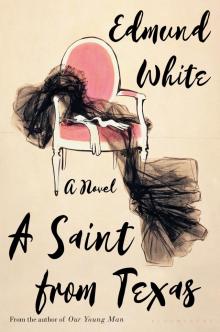 A Saint from Texas
A Saint from Texas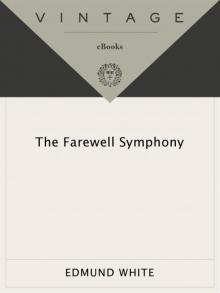 The Farewell Symphony
The Farewell Symphony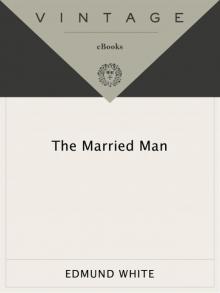 The Married Man
The Married Man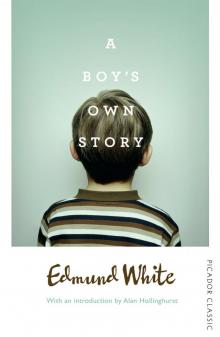 A Boy's Own Story
A Boy's Own Story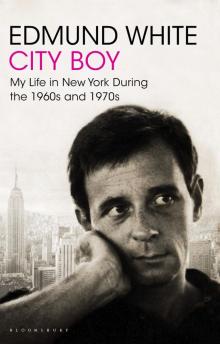 City Boy
City Boy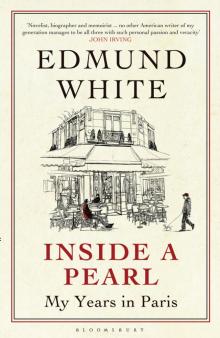 Inside a Pearl
Inside a Pearl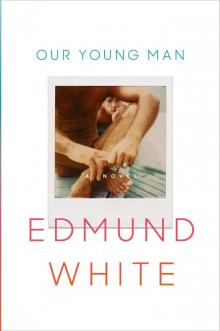 Our Young Man
Our Young Man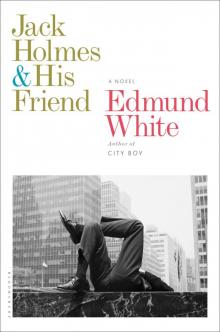 Jack Holmes and His Friend
Jack Holmes and His Friend